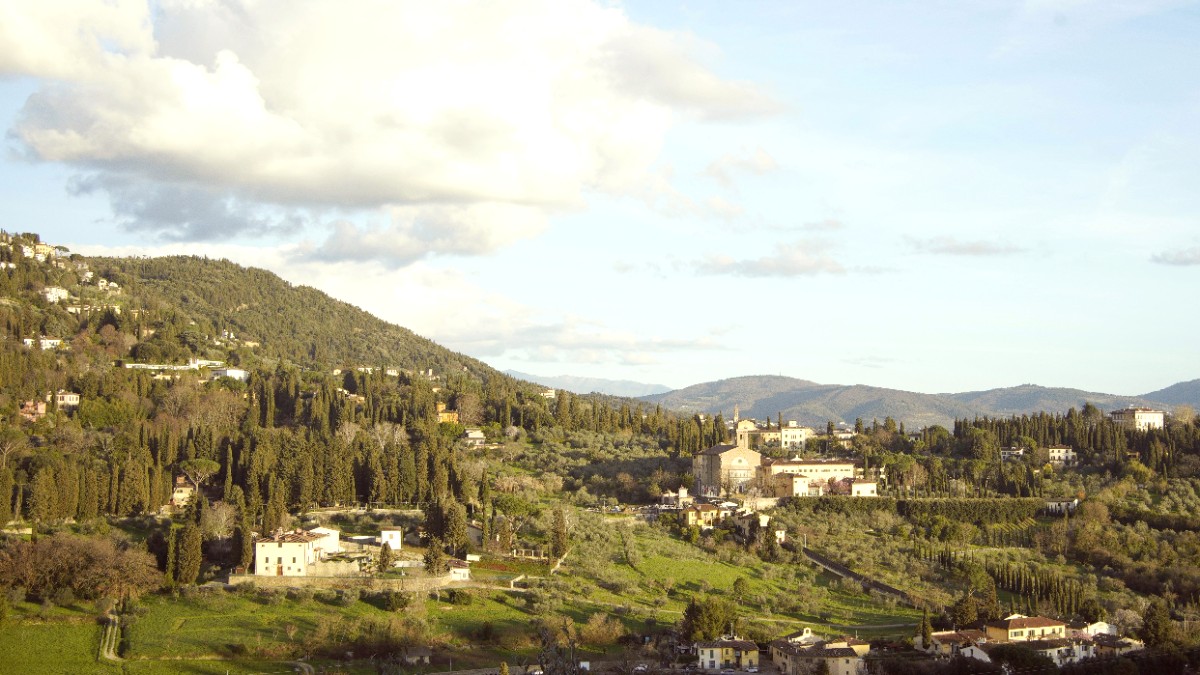
Tuscany, Italy
Fiesole's climate patterns vary by season, each presenting distinct conditions and experiences. Spring (April-May) features mild temperatures, typically 10 to 20 degrees Celsius (50 to 68 degrees Fahrenheit), with moderate rainfall. Summer (June-August) brings hot temperatures, often 20 to 35 degrees Celsius (68 to 95 degrees Fahrenheit), with low precipitation. July and August can exceed 30 degrees Celsius (86 degrees Fahrenheit). Autumn (September-October) brings mild to cool temperatures, 10 to 25 degrees Celsius (50 to 77 degrees Fahrenheit), and increased rainfall. Winter (November-March) presents cool to cold temperatures, 0 to 10 degrees Celsius (32 to 50 degrees Fahrenheit), with higher precipitation, mostly rain, and occasional light snow.
Humidity levels are generally moderate throughout the year, rising slightly in winter. Fiesole's elevated position often offers some relief from the valley's heat in summer. Summer heatwaves can be intense; hydration and seeking shade during midday hours support comfort. Winter weather can be cold and damp, calling for warm, waterproof clothing.
High Season (June-August): Sunny weather, all attractions open. The Fiesole Estate (Summer Festival) at the Roman Theatre happens. Crowds are large; accommodation and flight prices are at their peak. Temperatures can be very hot, especially in July and August. Sun protection is advisable.
June-August
Warm, sunny weather, all attractions open, outdoor concerts.
Highest prices, large crowds, very hot temperatures.
April-May, Sept-Oct
Pleasant temperatures, fewer crowds, lower prices. Ideal for hiking.
Unpredictable weather, chance of rain. Layers advised. Waterproof jacket or Small umbrella.
November-March
Fewest crowds, lowest prices. Authentic local feel.
Colder weather, shorter daylight. Some attractions may reduce hours.
Summer heatwaves can be intense. Hydration and seeking shade during midday hours are important. Carry a Reusable water bottle and refill it often. Winter can bring cold, damp weather. Warm, waterproof clothing, including a good coat, Scarf, and Gloves, come recommended.
Sightseeing and walking are comfortable in Spring (April-May) and Autumn (September-October) temperatures. Outdoor Concerts at the Roman Theatre happen in summer (June-August) as part of the Fiesole Estate festival. Wine Tasting and Countryside Exploration are ideal in Autumn (September-October), coinciding with the harvest season. For budget travel, the low season (November-March) presents the most affordable travel options.
Pack layers for variable weather. Consider hiking activities.
Prioritize early morning/late afternoon activities. Stay hydrated.
Embrace the quieter atmosphere. Confirm opening hours for attractions.
Book popular accommodations and tours in advance for peak times.
Check forecasts closer to your travel date for daily planning.
Italy is part of the Schengen Area, influencing entry rules for many nationalities.
Travelers from many non-EU/EEA/Swiss countries need a Schengen Visa for stays up to 90 days within any 180-day period, unless a visa-exemption agreement is in place. Apply for a Schengen Visa through the Italian Embassy or Consulate in your country of residence.
Have all your documentation ready for border control. This prevents delays upon arrival.
Prices vary based on your travel style, from budget-friendly to luxury. The official currency in Italy is the Euro (€, EUR).
Italy presents good healthcare and a generally safe environment. Awareness of local practices helps prevent issues.
No specific vaccinations are required. Ensure routine vaccinations (MMR, DTP, Polio, etc.) are current. Hepatitis A/B for longer stays is sometimes suggested. Consult a healthcare professional before travel.
Heat exhaustion/sunburn (summer): Stay hydrated, use Sunscreen, wear a Wide-brimmed hat, Sunglasses. Dehydration: Drink plenty of water; tap water in Fiesole is safe. Upset stomach: Low risk, practice hand hygiene. Mosquitoes: Use Insect repellent in warmer months.
Emergency number: 112 (general European emergency). Pharmacies (Farmacia) display a green cross. Nearest major hospital is Careggi Hospital in Florence. Doctors may speak English; ask hotel for recommendations.
Italy maintains high food hygiene standards. Eat at reputable establishments.
Tap water in Fiesole is safe to drink unless explicitly marked otherwise ("acqua non potabile").
A LifeStraw is useful if venturing beyond city water sources, but not necessary for Fiesole itself.
Always practice good hand hygiene, especially before meals.
Fiesole is a very safe town with low crime rates. Its serene environment makes for comfortable exploration.
The main concern in the broader Florence area, including buses to/from Fiesole, is pickpocketing. This happens in crowded areas and on public transport (bus #7 route) in Florence.
Be aware of your surroundings. Keep valuables secure (inside pocket, Money belt, or RFID blocking wallet). Avoid openly displaying large amounts of cash or expensive electronics.
While Fiesole is relatively safe from major natural disasters, awareness of potential seasonal hazards is helpful.
Travel insurance is highly recommended for all travelers. It should cover medical emergencies, including emergency evacuation, trip cancellation or interruption, and loss or theft of personal belongings.
Medical emergencies, evacuations, trip disruptions, and lost belongings.
Review policies from companies like World Nomads or SafetyWing.
Carry a basic Adventure Medical Kit for minor ailments.